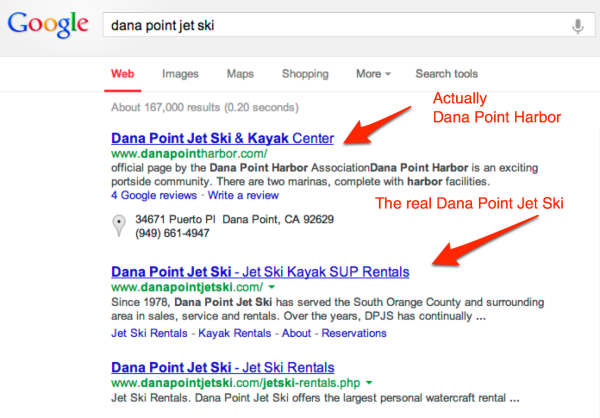When Google Gets It Wrong By Changing The Titles Of Web Pages
Google doesn’t always use the HTML title tag of a web page, choosing instead to make its own title for a page, if it thinks it can do a better job. Here’s an example of it getting this completely wrong. I was searching for Dana Point Jet Ski, which is a real business in Dana […]
Google doesn’t always use the HTML title tag of a web page, choosing instead to make its own title for a page, if it thinks it can do a better job. Here’s an example of it getting this completely wrong.
I was searching for Dana Point Jet Ski, which is a real business in Dana Point. Google instead listed the official page for Dana Point Harbor first:

Listing the wrong site first is a relevancy problem. But changing the title of the page to “Dana Point Jet Ski & Kayak Center” is a double-fail. That’s Google reinforcing its error, because it’s so sure that it’s right.
See, Google has long operated under the assumption that despite whatever the official title of a page is, Google knows better about how to describe that page. To be fair, there are good reasons for this. Sometimes people fail to properly indicate titles for their pages, so the rewriting can be useful.
Still, Google makes mistakes. That’s one reason why I’ve wished for years that Google would let site owners have something like a “Yes, I’m really sure I want you to use my title tag” tag. That would let publishers encountering this type of problem finally solve it.
This business, apparently, has long been suffering. After talking to them about a kayak, I asked if they knew about this problem that was happening on Google. “Oh, yes.” The woman I was talking with said she does all their marketing, and that they’d talked to Google several times about it. And that it would get fixed, then come back. She said they’d “given up” at this point despite it being “really annoying.”
Whom had she talked with? Their Google rep — in other words, apparently someone at Google who helps with their advertising.
The ad department, of course, can’t solve a listing problem. They’re disconnected with that, since ads and non-paid search listings are separate from each other. An ad person could, however, raise an issue like this for the listing team to explore.
Maybe that happened. Maybe it didn’t. But Google not allowing a publisher to say definitively that they want their title tag used certainly left this business without any real recourse.
To understand more about how title tags work, see the articles below. The first goes into depth about the subject:
- Writing HTML Title Tags For Humans, Google & Bing
- Is Google Ignoring The HTML Title Tag More Often?
- Google’s May Updates: Inorganic Backlinks, Page Titles, Fresh Results & More
Postscript: Local search expert Andrew Shotland has a nice piece trying to diagnose how Google may have gotten this wrong.
Contributing authors are invited to create content for Search Engine Land and are chosen for their expertise and contribution to the search community. Our contributors work under the oversight of the editorial staff and contributions are checked for quality and relevance to our readers. The opinions they express are their own.
Related stories